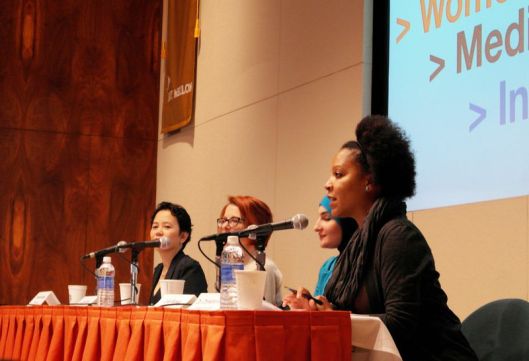
Greer has received accolades for her commentary on African American politics. Courtesy of Flickr
By Laura Sanicola
“Author, professor, commentator — Christina Greer does it all, and few combine all of those areas of expertise better in the world of New York City politics.”
This is how City & State magazine described Christina Greer, Ph.D, after naming her on its list of NYC’s “40 Under 40 Rising Stars.” An esteemed professor of political science at Fordham College Lincoln Center, Greer was listed as a “rising star” in New York City’s next generation of political figures.
City & State, which covers NYC government and politics, annually honors individuals under the age of 40 who work in NYC in fields such as politics, journalism, academia, technology and crisis management. According to their website, Greer was chosen from a pool of 600 nominees. Aside from her duties as a Fordham professor, Greer is heavily involved in research and commentary on African American politics. A graduate of Tufts University and Columbia University, Greer is in the process of writing her second book, which dispels the popular misconception that black political figures such as Barack Obama, Jesse Jackson and Al Sharpton are the only African Americans that have run as candidates for elected office.
“I started putting together a list of names and found that there are roughly 60 African Americans who have run or been nominated for the presidency from 1872 to the presidency,” Greer said in an interview. “My book analyzes the significance of the fact that about 75 percent ran on third party tickets. I’m looking at what was the point of their candidacies and look at how these third party candidates strengthen two party politics.”
Her book will also explore the theory of third party candidates, moving beyond traditional third party development — which she believes largely ignores race – and investigating how race plays into a larger narrative of political development.
In 2013, Greer published an award winning book entitled Black Ethnics: Race, Immigration, and the Pursuit of the American Dream. In the book, she explored how black Americans identify themselves in American society, how black Americans are treated by political figures in society, and what the “American dream” looks like for the different subsets of black Americans.
“It is important to remember that black Americans are not a monolithic group,” Greer said. “They come from many varied countries throughout several generations as both voluntary immigrants and involuntary migrants. But in today’s society, we are seeing black Americans trying not to assimilate because they don’t just want to become black Americans, they just want to be seen as Americans. However, when incidents happen like that of Trayvon Martin, Rodney King and Mike Brown, they have no choice but to identify with this larger racial group.”
As a young African American professor, Greer finds herself approached by Fordham students who feel marginalized in any way, several of whom find these conversations as important as she does.
“There is a limited number of faculty of color who are being pulled in a thousand different directions,” Greer explained. “Conversations about race and class can’t just occur once a year or in response to an incident. It has to be a sustained effort.”
Greer uses her extensive political connections in order to bring these important discussions on campus. On Nov. 6, she will be hosting a symposium at Lincoln Center at 4 p.m. in room 309 of the Lowenstein building, where she and five political scholars will be analyzing the results of 2014 elections.
“I’ve held panels like this in the past, and they’ve been important for students to meet the people whose jobs can bring them their information about politics and current events,” Greer said. “Another benefit from these panels is that students have gotten internships from the people I invite. They learn to make a pitch, follow up, and professionalize.”
In her classes, Greer tries to make the point that the way Americans understand class affects people’s personal lives and political ideologies, and that current events that may seem distant have effects on everyone’s daily lives.
“Everything that is going on is linked to you,” Greer said, “whether it be a war that takes up money that could be used towards your financial aid, or another large government expense that results in less money for public schools or for you’re the businesses your parents work at. Things big and small directly affect your life.”
Greer also advocates students to comprehensively read the news every day.
“It should be like brushing your teeth: it’s the first thing you get done in the morning and at the end of the day, and if you’re really diligent, multiple times throughout the day.”
__________
Laura Sanicola is the Assistant News Editor for The Fordham Ram.
